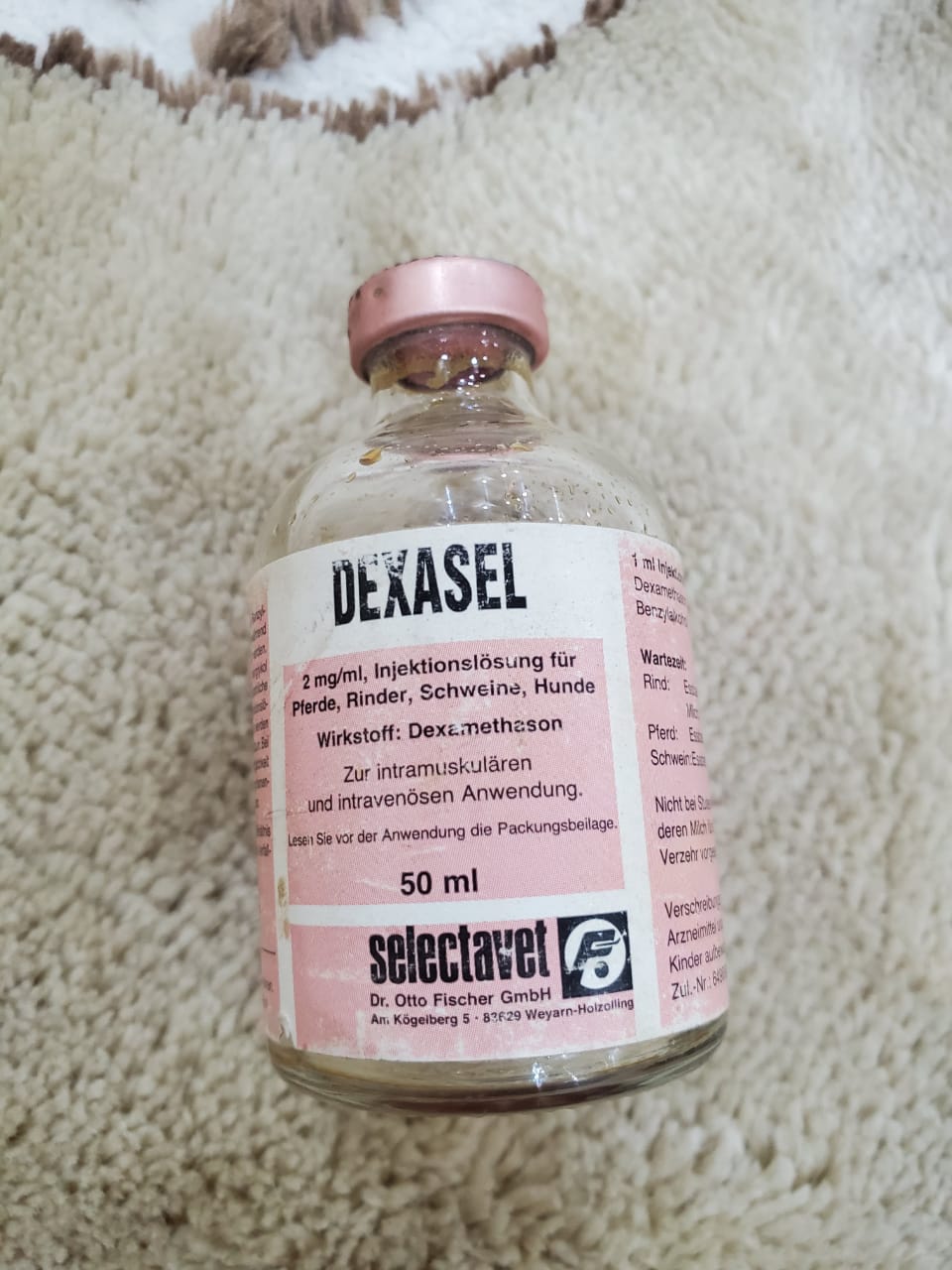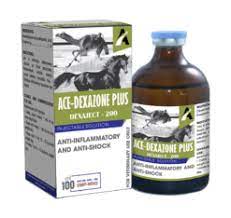Dexasel
Elevated Blood Sugar:
Dexasel can cause an increase in blood sugar levels, so animals with diabetes may need careful monitoring and adjustments to their insulin doses.
Contraindications:
Infections:
Dexasel should not be used in animals with active infections unless they are also receiving appropriate antimicrobial therapy, as it can worsen infections by suppressing the immune system.
Pregnancy:
Dexamethasone can affect fetal development and should be used with caution or avoided in pregnant animals.
Diabetes:
Animals with diabetes need careful monitoring as corticosteroids can cause elevated blood sugar levels, making it harder to manage diabetes.
Gastrointestinal Ulcers:
Animals with a history of ulcers or gastrointestinal issues should avoid long-term corticosteroid use as it can exacerbate these conditions.
Liver or Kidney Disease:
Animals with compromised liver or kidney function should be closely monitored, as dexamethasone can place additional strain on these organs.
Precautions:
Tapering Off:
Dexasel should not be abruptly stopped after long-term use, as it can lead to adrenal insufficiency. The dosage needs to be gradually reduced (tapered) to allow the adrenal glands to resume normal cortisol production.
Monitoring for Infections:
Regular checkups are necessary to monitor for infections, especially during long-term use, due to the immune suppression caused by dexamethasone.
Electrolyte Imbalance:
Dexamethasone can cause imbalances in sodium, potassium, and other electrolytes. Monitor the animal’s diet and ensure it has access to clean, fresh water at all times.
Drug Interactions:
NSAIDs: Using non-steroidal anti-inflammatory drugs (NSAIDs) alongside corticosteroids increases the risk of gastrointestinal ulcers and bleeding.
Vaccines: Corticosteroids can suppress the immune response to vaccines, reducing their effectiveness.
Diuretics: Concurrent use with diuretics can exacerbate electrolyte imbalances.
Storage:
Store Dexasel in a cool, dry place, away from direct sunlight. Avoid freezing, and ensure it is kept out of reach of children and animals.
Conclusion:
Dexasel is a powerful corticosteroid used in veterinary medicine to manage a wide range of inflammatory, allergic, autoimmune, and respiratory conditions. While it can be highly effective in reducing inflammation and controlling immune responses, it carries a risk of side effects, particularly with long-term use.
Animals on Dexasel should be carefully monitored, and the medication should be administered under the guidance of a veterinarian. Proper dosing, regular checkups, and gradual tapering off of the medication are essential for ensuring the safety and well-being of the animal.
Dexasel
Dexasel is a veterinary product that contains dexamethasone, a potent corticosteroid used for its anti-inflammatory, immunosuppressive, and anti-allergic properties. Below is a detailed account of what you need to know about Dexasel, including its uses, dosage, side effects, and precautions in veterinary medicine.
Key Component:
Dexamethasone: The active ingredient in Dexasel, dexamethasone is a synthetic corticosteroid that mimics the effects of natural corticosteroids produced by the adrenal glands. It is significantly more potent than other corticosteroids such as cortisone or hydrocortisone, which makes it highly effective in treating various conditions in animals.
Uses of Dexasel:
Dexasel is used in veterinary medicine for a wide range of conditions due to its powerful anti-inflammatory and immunosuppressive properties. Some of the common uses include:
Anti-inflammatory:
Dexamethasone is used to reduce inflammation in animals suffering from conditions like arthritis, joint pain, and tendonitis. It is especially effective in managing acute or chronic inflammatory conditions.
Allergic Reactions:
Dexasel is used to manage severe allergic reactions, including skin allergies, respiratory allergies, and anaphylaxis. It helps control the body’s immune response to allergens.
Autoimmune Disorders:
In cases where the animal’s immune system is attacking its own tissues (autoimmune diseases), dexamethasone can help suppress this response. It is used for conditions like autoimmune hemolytic anemia and immune-mediated polyarthritis.
Respiratory Conditions:
It is often used in the management of respiratory diseases in horses, such as chronic obstructive pulmonary disease (COPD) or recurrent airway obstruction (RAO), where inflammation of the airways causes breathing difficulties.
Shock and Trauma:
In emergency situations, such as in the case of severe trauma or shock, dexamethasone can be used to stabilize the animal and reduce inflammation or swelling associated with the injury.
Skin Conditions:
Dexasel can be used to treat inflammatory skin conditions like dermatitis and eczema, which can result from allergic reactions or autoimmune diseases.
Hormone Replacement:
In cases of adrenal insufficiency, where the animal’s adrenal glands are not producing enough natural corticosteroids, dexamethasone can be used as a replacement therapy.
Dosage and Administration:
Administration: Dexasel is typically administered as an intramuscular (IM) or intravenous (IV) injection. In some cases, it can also be administered orally, depending on the formulation.
Dosage:
The exact dosage will depend on the animal species, size, weight, and condition being treated. Below are general guidelines:
Horses: Dosage ranges from 2 mg to 10 mg depending on the severity of the condition. For severe inflammation or allergic reactions, higher doses may be recommended.
Dogs and Cats: For smaller animals, the dosage is much lower, usually around 0.1 mg/kg body weight, and should always be determined by a veterinarian.
Always follow the veterinarian’s instructions on the appropriate dosage and administration schedule.
Side Effects:
While Dexasel (dexamethasone) is effective in treating various conditions, there are several potential side effects, particularly with long-term use:
Increased Thirst and Urination:
Corticosteroids like dexamethasone can cause animals to drink more water (polydipsia) and urinate more frequently (polyuria).
Gastrointestinal Issues:
Long-term use may cause gastrointestinal upset, including stomach ulcers or an increased risk of infections in the digestive tract.
Immune Suppression:
Prolonged use of corticosteroids suppresses the immune system, making animals more susceptible to infections.
Laminitis in Horses:
One of the most serious risks in horses is the potential for developing laminitis, a painful and debilitating condition affecting the hooves.
Behavioral Changes:
Some animals may experience behavioral changes, such as increased irritability, lethargy, or hyperactivity.
Weight Gain:
Dexamethasone can cause increased appetite, leading to weight gain, especially with long-term use.
Delayed Healing:
Due to its immunosuppressive effects, wounds or infections may take longer to heal while an animal is on dexamethasone.
Adrenal Suppression:
Long-term use can suppress the adrenal glands, which reduces the animal’s ability to produce natural corticosteroids. This can result in adrenal insufficiency if dexamethasone is suddenly stopped.




Reviews
There are no reviews yet.